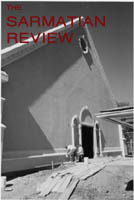From the Editor
January 2001
Vol. XXI, No. 1
This issue contains the first translation into English of portions of Kazimierz Braun's novel, Day of Witness. Christopher Zakrzewski's translation is superb. What is striking about the novel is its tone of moral probity and a corresponding ability to proclaim the foundational truths of European culture. An ability to conjure up that tone is Braun's great achievement. On the level of social reality, the novel is disquieting. Its presentation of the failure of Polish Americans to maintain their once-vibrant churches is right on target, and so is its suggestion of incipient dangers to the simple--too simple--religiosity that has traditionally sustained Polish peasants in their struggle for survival.
The books on the persecution of Catholics in the Russian Empire (reviewed in BOOKS) flesh out the historical circumstances of these failures and dangers. Those colleagues whose knowledge of Russian history comes from Russian-authored textbooks (sometimes merely paraphrased in the popular American histories of Europe and Asia) ought to supplement their knowledge by tomes like these. Edward Said's argument about the evils of colonialism is here amply albeit unwittingly illustrated. These tomes call for dedicated translators and suitable scholarly publishers. The volumes reviewed contain the scholarly apparatus; there is no need for scholarly editing, only for a translation into English.
In the Letters section, Professor Raymond Gawronski's remarks merit attention. Fr. Gawronski points out that if one disregards worldly success and pays attention to the Thomistc telos, the achievements of old Polish immigration were not inconsiderable, as measured by the numerosity of churches that served several generations of Polish Americans.
These texts indicate that discourse about religious identities and experiences is a legitimate academic topic. All too often, however, it has been shunned in academia especially with regard to ethnic Americans.
Other texts in this issue include Professor Alex Kurczaba's article on the miserable status of Polish studies in the American academy. The article cannot be praised highly enough. With his customary caustic humor, Kurczaba exposes the pious platitudes of those who give self-promoting speeches (and write articles for the Polish press) about the alleged successes of Polish studies, Polish professors, Polish writers, etc., in America. The reality is that there are fewer than ten full time instructors of Polish subjects in the United States, while there are thousands of full time instructors in Russian subjects. There is no quick fix to these inequities, but it is important to keep them in mind, rather than lose interest because the struggle for equity is difficult and protracted.
John Radzilowski raises the issue of how to be effective in the social conditions of America. He notes that perhaps the tactics of the Polish American struggle has been wrong: instead of concentrating on Poland and its need for warm winter socks, Polish Americans should rather emphasize the fostering of their own unique identity as both American and Polish. The topic seems to be tailor-made for a comparative sociologist or historian. Radzilowski rightly states that Americans of Polish background are not uprooted Poles, and that the treatment they sometimes receive from the Polish media and from émigré Poles is based on an inability to accept that fact.
Radzilowski's remarks pertain also to other Central and Eastern European ethnicities in America. To us it seems that the smaller the ethnic community, the stronger its identification with the 'old' country. Larger groups have long noted, as Polish Americans are beginning to do, that the problem lies in self-identification in new circumstances, rather than in incessant wondering how one measures up vis-a-vis the 'old' country. The balancing off of ethnic and American identity is a delicate process that is easily derailed. In this regard, those of English background have lulled themselves to an easy slumber: their identification with the 'old' country has never ceased, yet it seldom occasions much self-examination. The ethnic prejudices of the British (e.g., their proclivity not to see the imperialism of other large empires) might have exerted an influence on Slavic Studies in this country.
Back to the January 2001 issue
The Sarmatian Review
sarmatia@rice.edu
Last updated January 2001.
